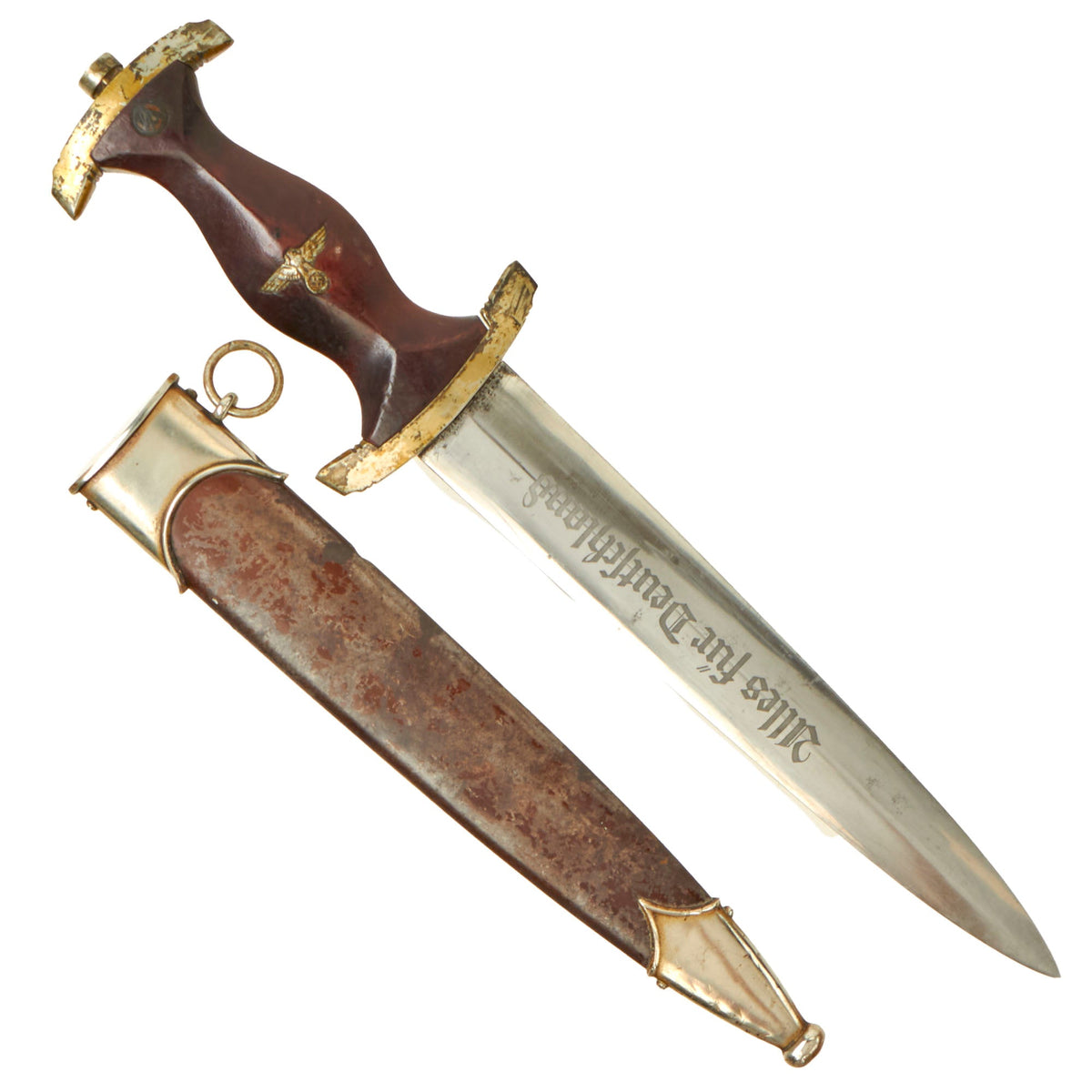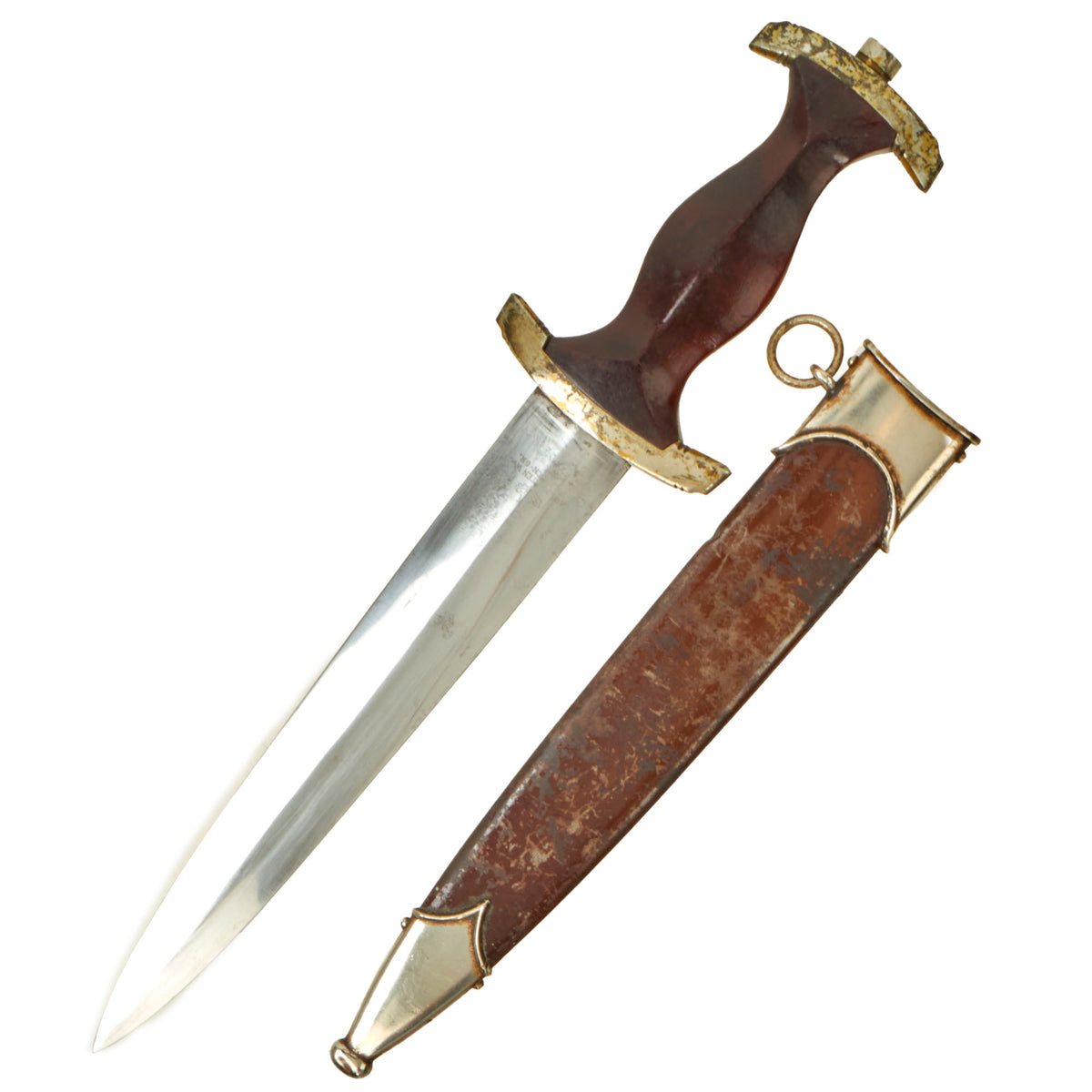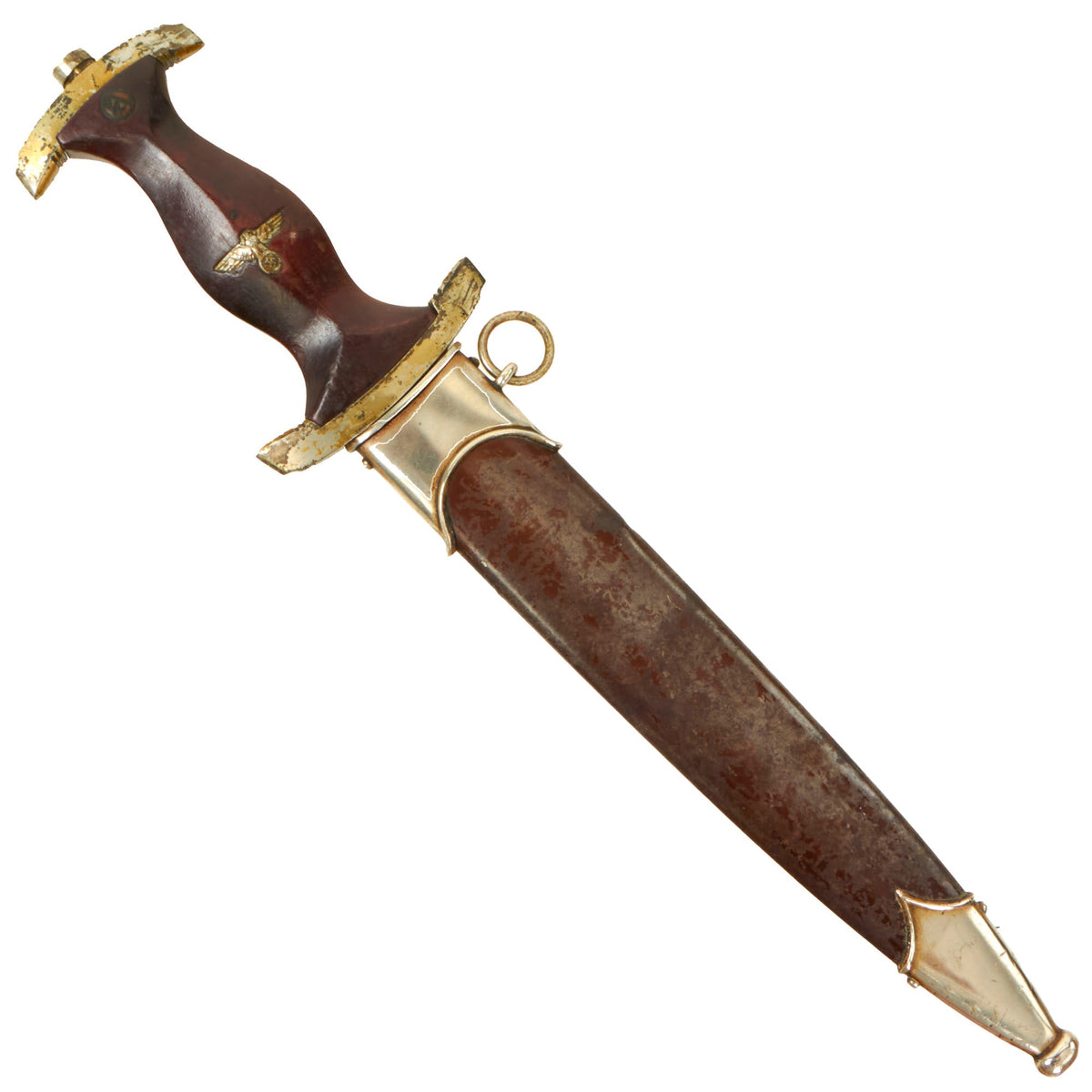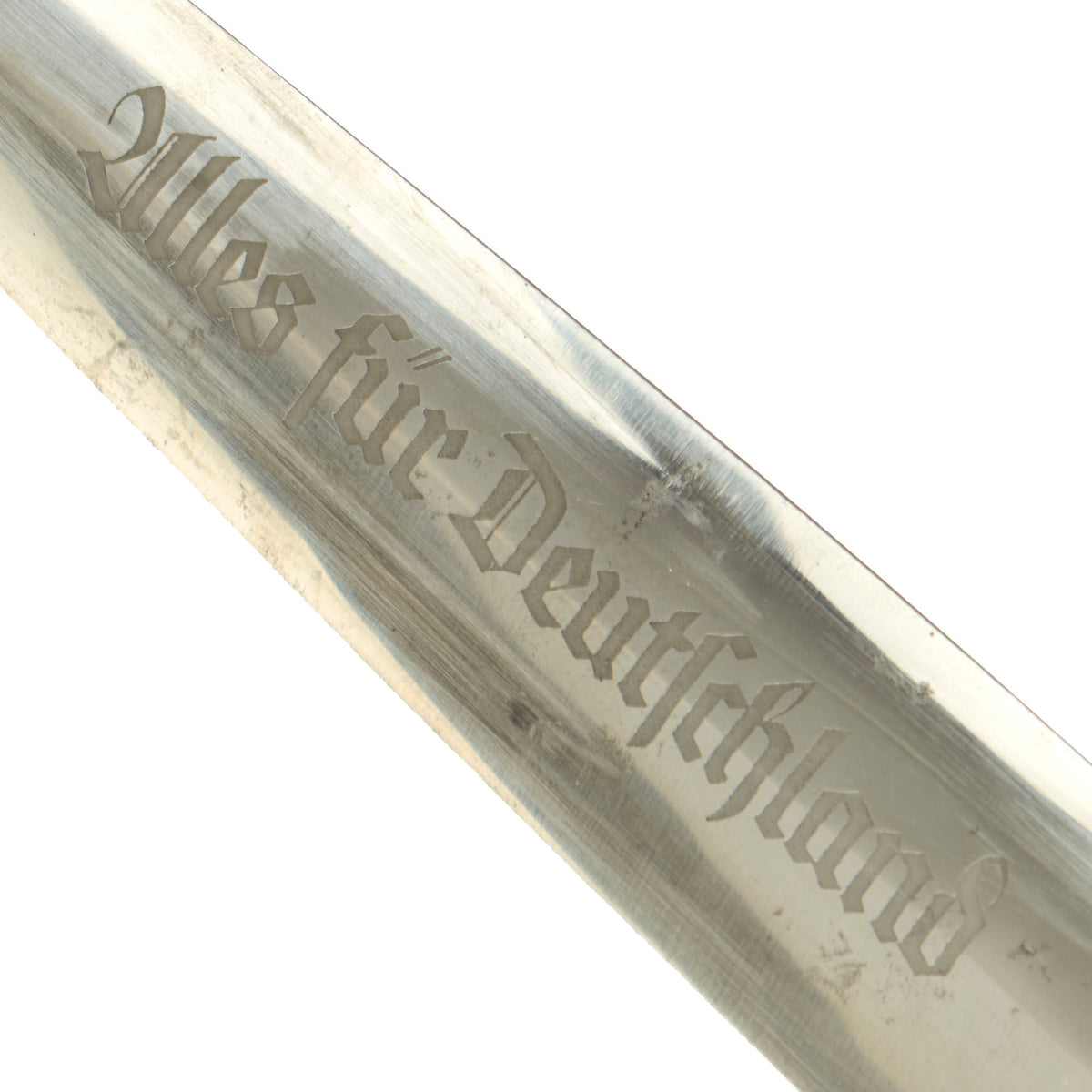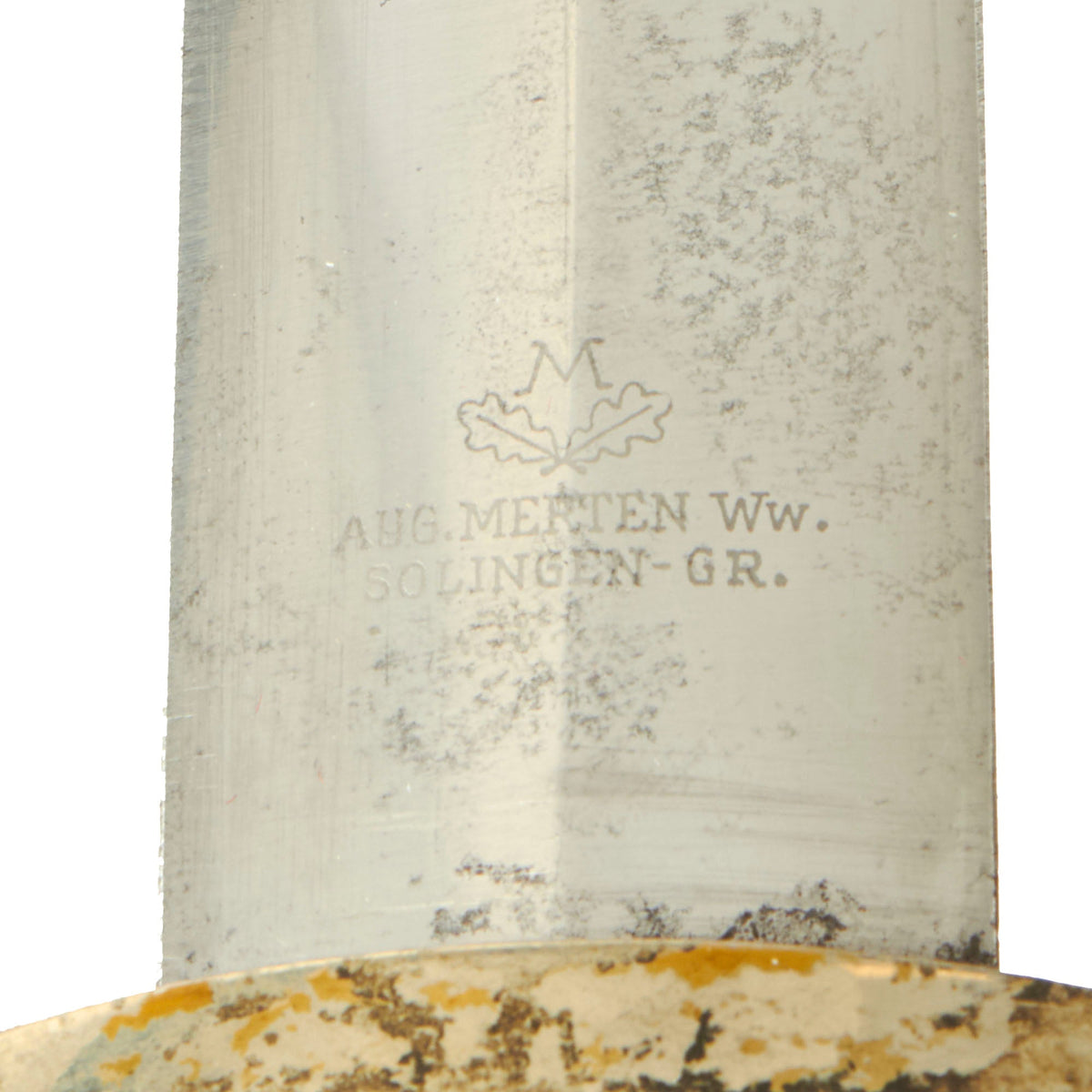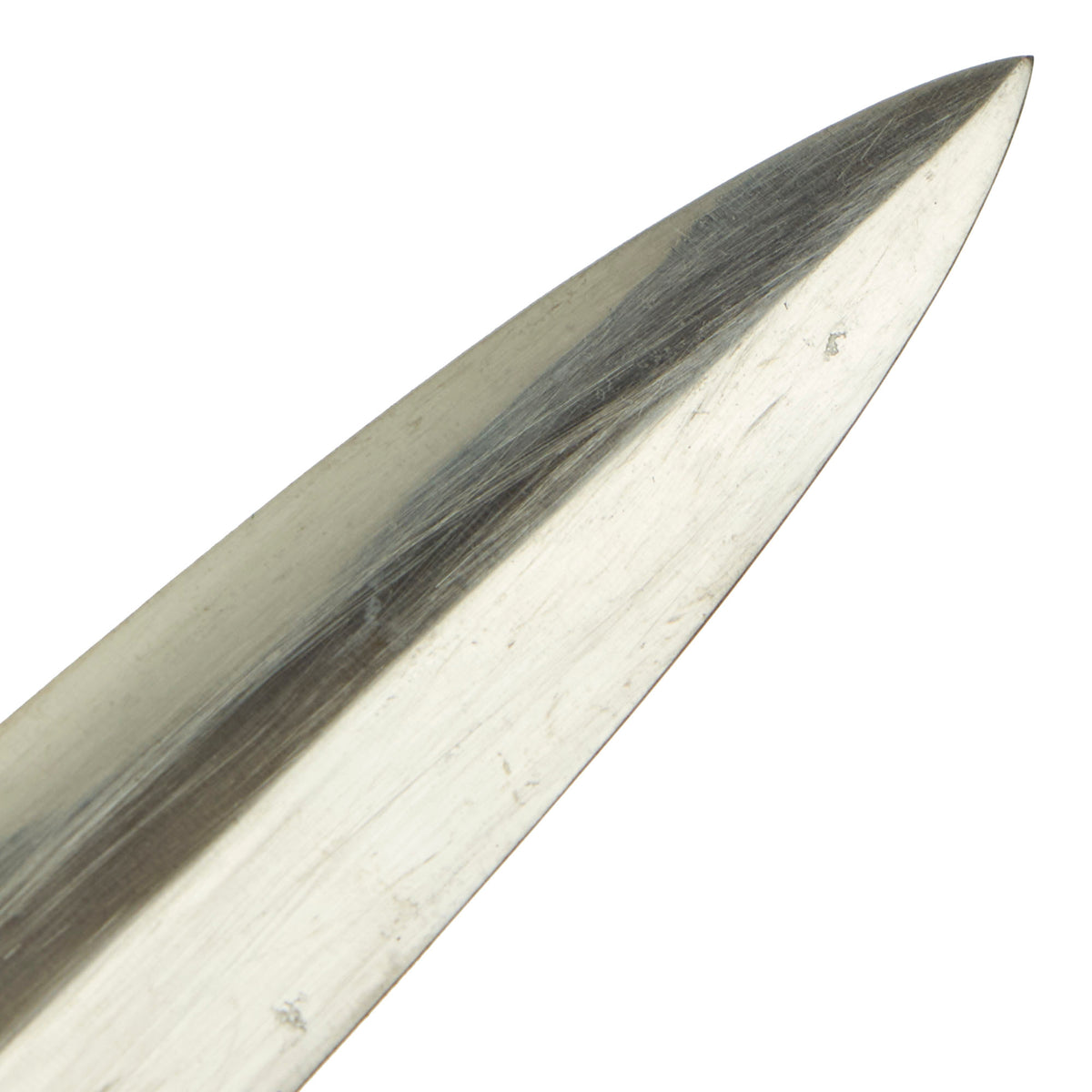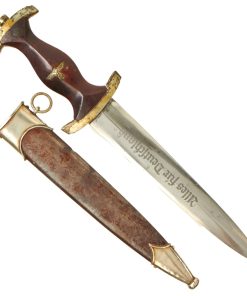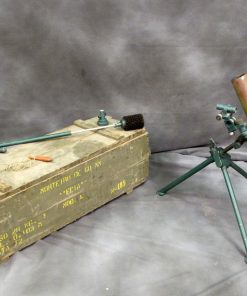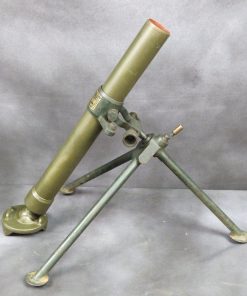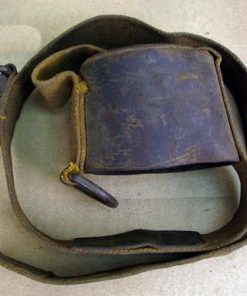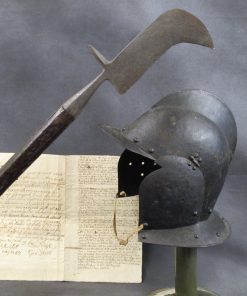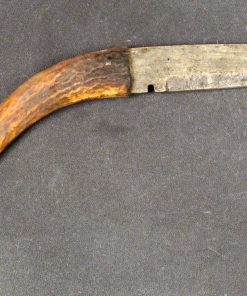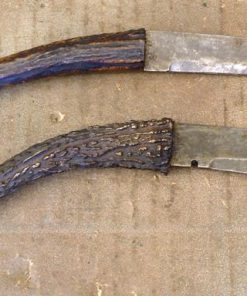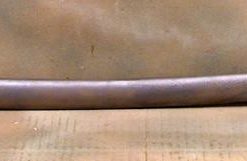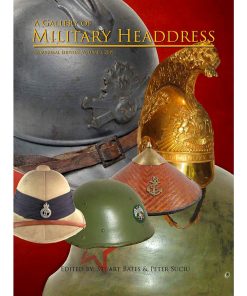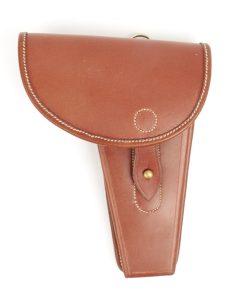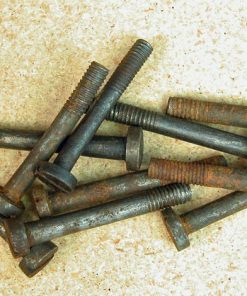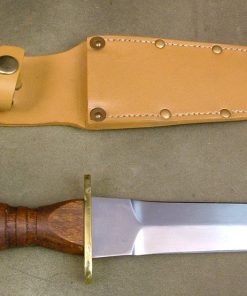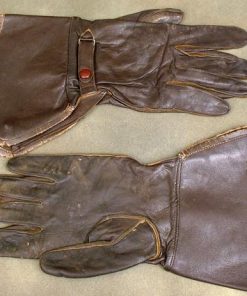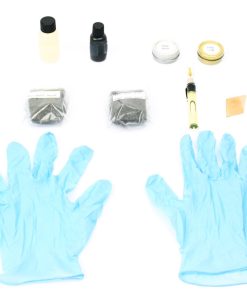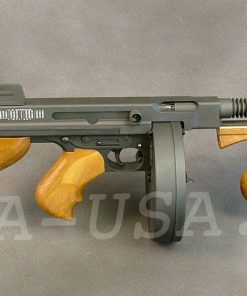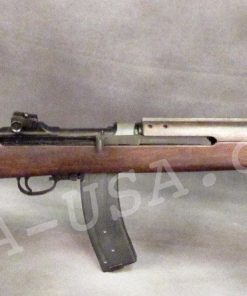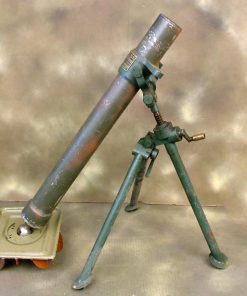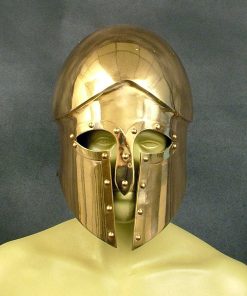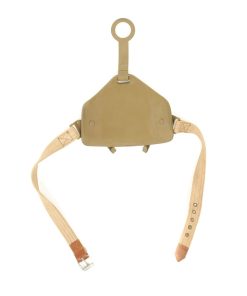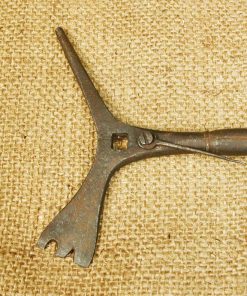Original German Early WWII SA Dagger by Rare Maker August Merten of Solingen with Scabbard Original Items
$ 1.150,00 $ 287,50
Original Item: Only One Available. This is a very good condition early pattern SA Dagger, made by the rare maker August Merten of Solingen, the legendary “City of Blades” in Western Germany. This company had made SA daggers since the Röhm era, and continued to produce early pattern knives after that period, however never in large numbers. This is the first example of a Merten SA dagger that we have had. It comes complete with an original scabbard, which is the correct early war pattern.
The dagger and scabbard do look to have at some point been finished overall with an amber lacquer, which has flaked away over the years from the scabbard and the fittings, but is still retained on the grip wood. This has resulted in discoloration and oxidation in areas, and definitely was applied a very long time ago, possibly during the WWII period as a method of protection. It has given this dagger a very unique look.
The dagger has solid nickel silver fittings throughout, and is a nice example. The cross guards and tang nut are in very good condition throughout with all fittings having a nice aged patina from oxidation and the finish that was applied. There is some age to these mounts but there is no lifting anywhere, showing that they are solid and not plated. They show moderate wear with discoloration from oxidation, and the hand executed accent grooves are all in great condition. The reverse crossguard is partially stamped on the right side Gruppe/Gau marked Ho, for Hochland (Highlands) a district in the far South German mountains, with the principal city being München (Munich). This feature was only seen on daggers produced 1935 and prior.
The grip is a fine product having a lovely dark red brown color, with medium center ridge construction, showing light wear and denting. The finish applied to the grip has definitely made it a bit dark and it was also applied over the insignia, which now show oxidation, especially the symbol button. There are no cracks or chunks missing that we can see, so the wood at least was well-protected Since then there is some wear to the finish, with some scuffing and chipping in areas. The pommel nut definitely shows some turning, though the grip is still tight on the tang. As mentioned before, the SA symbol button is quite oxidized, and only retains part of the original enamel. The grip eagle is a fine example being the style with beak that points straight. The details are still there to the eagle to include the beak, breast feathering, wing feathering, talons, wreath and mobile swas (hook cross). It has however patinated due to the finish applied, as with the other metalwork on the dagger.
The blade of this example is in very good condition, with the factory final polish cross grain still visible throughout the blade. This texture is iconic, and is the definitive identifying characteristic for a real WWII German Blade. This has been removed by runner wear, as is standard, and we can see some past cleaning of the blade, but only to remove light staining. There is some oxidation where the blade meets the cross guard, probably due the scabbard letting in moisture. The blade edge is somewhat sharp, but it definitely looks to be from the factory. The acid-etched Alles für Deutschland (Everything for Germany) SA motto is crisp, with the factory darkening well retained.
The reverse ricasso is maker marked with the Eichenlaub (Oak Leaves) trademark of August Merten Eichenlaub Stahlwarenfabrik (Oak Leaves Steelware Factory) of the Gräfrath borough of Solingen:
M
(Crossed Oak Leaves)
AUG. MERTEN Ww.
SOLINGEN – GR.
This company was founded in 1910 by August Merten, and registered with Solingen Authorities in 1919. After the passing of August, the name was changed to August Merten Witwe (August Merten’s Widow). By the NSDAP period, it was owned by Erich, Friedrich, and Werner Merten, as listed in the 1939 DRAB. They made a small number of Army, SA, and NSKK daggers during the war, which were marked with the full address marking, as seen on this example. They also made HJ knives with the M “Oakleaves” trademark over SOLINGEN, per J. Anthony Carter’s fine work GERMAN SWORD AND KNIFE MAKERS. The company survived the war, and was in operation until 1998, when the company and trademarks were sold to Robert Herder.
The scabbard shell is mostly straight and is the early-war style, which has a brown “anodized” finish on the steel, which was then lacquered. This example has lost much of the lacquer, and it is possible that some is from the second coating that was applied. This has allowed the anodized finish to wear, and some oxidation to occur to the steel shell, which also has some dents. It still shows the brown color well however, and has a great aged look.
The upper and lower fittings are solid nickel silver, with a great look and they also look to have been finished / lacquered at some point, which was then cleaned away on most areas. The chape fitting at the end of the scabbard is dented, though not split, as the nickel alloy is somewhat soft, a common thing to see. The throat nicely matches the crossguards, and all fittings have their original dome headed screws, which are in very good shape.
A very nice early war SA dagger from a very rare and desirable Solingen maker, complete with an original scabbard. Ready to display!
Specifications:
Blade Length: 8 3/4″
Overall length: 13 3/4”
Crossguard: 3”
Scabbard Length: 10”
History of the SA-
The SA or Brown Shirts, were a private political formation which Adolf AH and the NSDAP used to maintain order at organized Party meetings and demonstrations. The group was formed in 1921, and grew to a huge force of nearly 3,000,000 men by the later 1930’s. To instill esprit de corps, as well as create employment for the Blade City of Solingen, it was decided each SA man would carry a dagger with his Brown Shirt uniform. Huge quantities needed to be produced to accommodate the demand. The dagger initially was produced of hand-fitted nickel mounts with attractive finished wood grip and brown anodized (a bluing process) finished scabbard.
The blade was etched with the SA motto, Alles für Deutschland. Examples produced prior to 1935 were stamped with the German sector of the SA group on reverse lower crossguard. Later examples underwent standardization through the RZM ministry. These pieces were produced of cheaper plated zinc-base fittings and scabbards were simply painted brown.
Prior to his “unmasking” as a traitor, Ernst Röhm was the leader of the SA. In 1934, he distributed approximately 100,000 SA daggers with his personal inscription on the reverse blade. These daggers were to honor individuals who had served with the SA prior to December, 1931. Other than the inscription, these pieces were identical to the standard M1933 SA dagger. After the Röhm purge, the inscription was ordered to be removed. Many examples were returned to the factory for grinding. Others were simply ground in the field by whatever means were available. Examples will occasionally be encountered with remnants of the original inscription remaining on the blade, but mostly none will remain. Some blades exist with an intact inscription, reflecting only the removal of the Röhm signature. Very very rarely is an example seen with a full, untouched inscription, as the holder would have surely risked a charge of treason.
Fast Shipping with Professional Packaging
Thanks to our longstanding association with UPS FedEx DHL, and other major international carriers, we are able to provide a range of shipping options. Our warehouse staff is expertly trained and will wrap your products according to our exact and precise specifications. Prior to shipping, your goods will be thoroughly examined and securely secured. We ship to thousands clients each day across multiple countries. This shows how we're dedicated to be the largest retailer on the internet. Warehouses and distribution centres can be located throughout Europe as well as the USA.
Note: Orders with more than one item will be assigned a processing date depending on the item.
Before shipping before shipping, we'll conduct a thorough inspection of the items you have ordered. Today, the majority of orders will be delivered within 48 hours. The delivery time will be between 3-7 days.
Returns
The stock is dynamic and we cannot completely manage it because multiple stakeholders are involved, including our factory and warehouse. So the actual stock may alter at any time. It's possible that you may not receive your order once the order has been made.
Our policy is valid for a period of 30 days. If you don't receive the product within 30 days, we are not able to issue a refund or an exchange.
You can only return an item if it is unused and in the same state as the day you received it. You must have the item in its original packaging.
Related products
Uncategorized
Uncategorized
Uncategorized
Armored Burgonet Helmet & Polearm from Scottish Castle Leith Hall Circa 1700 Original Items
Uncategorized
Angolan Rebel 1970s era 60mm Inert Display Mortar from Angolan Civil War Original Items
Uncategorized
Uncategorized
Uncategorized
Uncategorized
Uncategorized
Uncategorized
Uncategorized
Uncategorized
Uncategorized
Uncategorized
Uncategorized
Uncategorized
